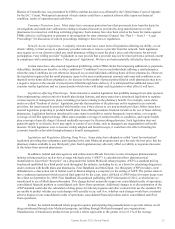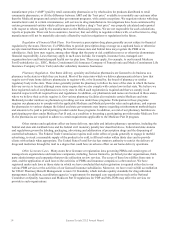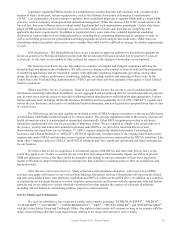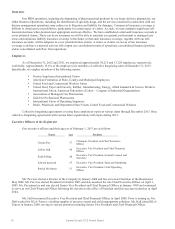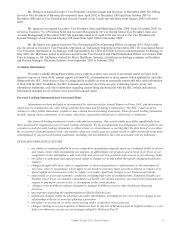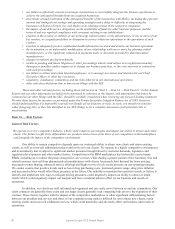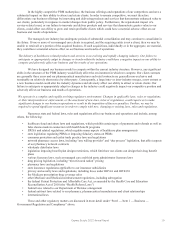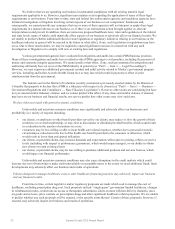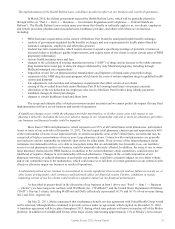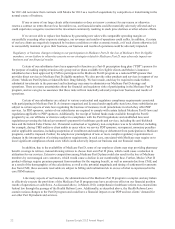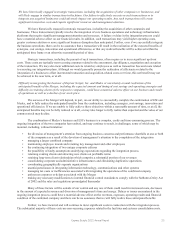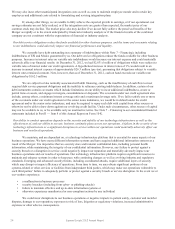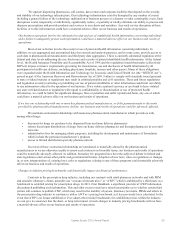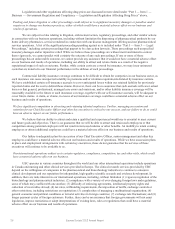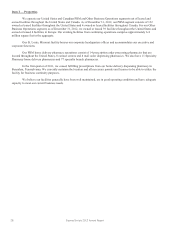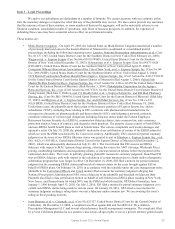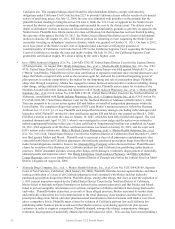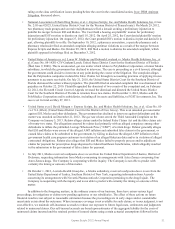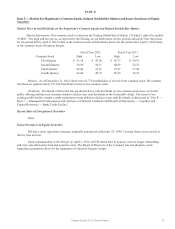Express Scripts 2012 Annual Report Download - page 25
Download and view the complete annual report
Please find page 25 of the 2012 Express Scripts annual report below. You can navigate through the pages in the report by either clicking on the pages listed below, or by using the keyword search tool below to find specific information within the annual report.
Express Scripts 2012 Annual Report 23
We have historically engaged in strategic transactions, including the acquisition of other companies or businesses, and
will likely engage in similar transactions in the future. Our failure to effectively execute on such transactions or to
integrate any acquired businesses could adversely impact our operating results. Any such transactions will create
significant transaction costs and require significant resources and management attention.
We have historically engaged in strategic transactions, including the acquisition of other companies and
businesses. These transactions typically involve the integration of core business operations and technology infrastructure
platforms that require significant management attention and resources. A failure or delay in the integration process could
have a material adverse affect on our financial results. In addition, such transactions may yield higher operating costs,
greater customer attrition or more significant business disruption than anticipated. Further, even if we successfully integrate
the business operations, there can be no assurance that a transaction will result in the realization of the expected benefits of
synergies, cost savings, innovation and operational efficiencies, or that any realized benefits will be achieved within the
anticipated time frame or an otherwise reasonable period of time.
Strategic transactions, including the pursuit of such transactions, often require us to incur significant up-front
costs. These costs are typically non-recurring expenses related to the assessment, due diligence, negotiation and execution
of the transaction. We may also incur additional costs to retain key employees as well as transaction fees and costs related
to executing our integration plans. Although we would generally pursue the realization of efficiencies related to the
integration of a business to offset incremental transaction and acquisition-related costs over time, this net benefit may not
be achieved in the near term, or at all.
Difficulty in integrating the business of Express Scripts, Inc. and Medco or uncertainty around realization of the
anticipated benefits of the Merger, including the expected amount and timing of cost savings and operating synergies and
difficulty in retaining clients of the respective companies, could have a material adverse effect on our business and results
of operations as well as a decline of our stock price.
The success of the Merger will depend, in part, on our ability to successfully complete the combination of ESI and
Medco, and to fully realize the anticipated benefits from the combination, including synergies, cost savings, innovation and
operational efficiencies. If we are unable to fully achieve these objectives within a reasonable amount of time, or at all, the
anticipated benefits may not be fully realized or at all, or may take longer to fully realize than expected and the value of our
common stock may decline.
The combination of Medco’s business and ESI’s business is a complex, costly and time-consuming process. The
ongoing integration of the two companies has resulted, and may continue to result, in challenges, some of which may be
material, including, without limitation:
Q the diversion of management’s attention from ongoing business concerns and performance shortfalls at one or both
of the companies as a result of the devotion of management’s attention to the completion of the integration
Q managing a larger combined company
Q maintaining employee morale and retaining key management and other employees
Q the continuing integration of two unique corporate cultures
Q the possibility of faulty assumptions underlying expectations regarding the integration process
Q retaining existing clients and attracting new clients on profitable terms
Q retaining long-term client relationships which comprise a substantial portion of our revenues
Q consolidating corporate and administrative infrastructures and eliminating duplicative operations
Q coordinating geographically separate organizations
Q unanticipated issues in integrating information technology, communications and other systems
Q managing tax costs or inefficiencies associated with integrating the operations of the combined company
Q unforeseen expenses or delays associated with the Merger
Q making any necessary modifications to internal financial control standards to comply with the Sarbanes-Oxley Act
of 2002 and the rules and regulations promulgated thereunder
Many of these factors will be outside of our control and any one of them could result in increased costs, decreases
in the amount of expected revenues and diversion of management’s time and energy. Delays or issues encountered in the
ongoing integration process could have a material adverse effect on the revenues, expenses, operating results and financial
condition of the combined company and there can be no assurance that we will fully realize these anticipated benefits.
Further, we have incurred and will continue to incur significant costs in connection with the integration process.
The substantial majority of these costs are non-recurring expenses related to the facilities and systems consolidation costs.


